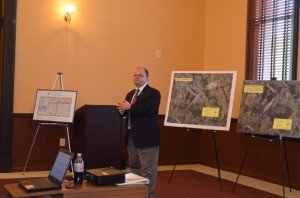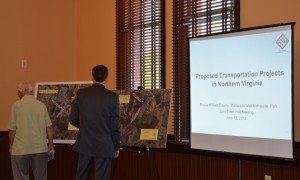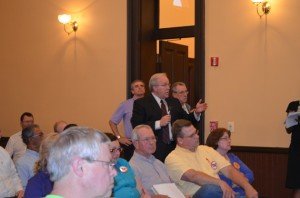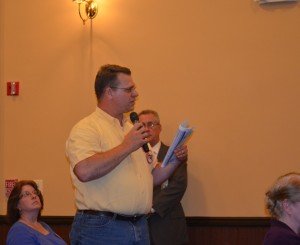
The Northern Virginia Transportation Alliance (NVTA) held a public meeting Wednesday evening to inform Prince William County, Manassas City and Manassas Park residents about new road and transit projects that are planned for next year.
The widening of Route 28 in Nokesville, the Vint Hill Road extension, a study on the Gainesville/Haymarket Virginia Rail Extension (VRE) and a new commuter bus leaving from Gainesville were among the Prince William County projects that Chairman Martin Nohe of the NVTA would like to see begin in 2014, should they gain approval from the NVTA at its July 20th meeting.
Chairman Nohe (R), Supervisor of the Coles District, held the informational meeting at the Old Manassas Court Building the evening of June 12. There, he outlined how Prince William County intends to spend its portion of the new sales tax revenue that will be returned to the local jurisdictions for projects in 2014.
In just 16 days, the sales tax will rise from 5 to 6 percent in Northern Virginia. That is .7 percent above what the rest of Virginia will be paying, since sales tax will rise by .3 percent elsewhere, except in Hampton Roads, where people will also be paying 6 percent, rather than 5.3 percent.
New revenue is also being provided for local transportation with a 2 percent statewide tax on hotel rooms and 15 cents per $100 of property value when a home is sold.
While no one likes to see his taxes rise, the good news is that Northern Virginians should get back the extra money they spend in the form of new transportation projects to ease road congestion in the Northern Virginia region and Prince William County.

Chairman Nohe told Bristow Beat in a phone interview that the new tax makes transportation funding “more fair.”
“The whole point was that money raised in Northern Virginia had to be spent in Northern Virginia on Northern Virginia problems,” Nohe said.
That is why the money will go directly to the NVTA, which has decided to keep 70 percent of it for regional projects and give the remaining 30 percent back to the jurisdictions. The Commonwealth expects the total revenue for Northern Virginia to average an estimated $275 million, while the portion that Prince William County will receive amounts to an estimated $8 million.
According to the NVTA, those funds must be spent on transit projects that will “ease congestion.” After that, projects that already have some funding and have already been vetted by the Virginia Department of Transportation (VDOT) and their jurisdictions are considered ideal.
In other words, the NVTA is encouraging “shovel ready” projects for 2014, although Nohe said he hesitates to use that phrase.
Nohe said the widening of Route 28 in Nokesville from two to four lanes and the extension of Vint Hill Road to Route 28 are perfect projects in terms of fulfilling those requirements.The Route 28 widening was approved by referendum in 2006; it already has $19 million in federal funding. On top of that, there is $6 million in proffered funding for the project, mainly from the Avondale developers, who also proffered money for adjusting Vint Hill Road. With the extra funding, the road work could be expedited without having to dip into county transportation funds or buying any bonds.
However, residents attending the meeting felt that the widening of Route 28 in Nokesville would benefit Fauquier residents traveling that length of Route 28, while Prince William County and Manassas residents get stuck in worse traffic congestion on Route 28 in Yorkshire near the Fairfax line.

As discussed in last week’s Board of County Supervisor’s meeting, Nohe explained that the county is nowhere near ready to address the Yorkshire congestion problem, though they are aware of it, but it is not currently on their Capital Improvement Plan.
In addition, widening the road would impact local businesses. Therefore Nohe believes they would likely need to seek a different solution altogether, perhaps an alternate road. Either way, it is not a good candidate for the NVTA local revenue funds.
As for green-lighting a new VRE station along Route 29 in Gainesville or Haymarket, Nohe said he believes it is something the people want. However, he wants to manage expectations because a new station could not be delivered immediately.
“What we’re funding is a feasibility study,” Nohe said. “Nothing about this first round of funding will put trains on the track, but we know there is a large community demand.”
The road extension at the intersection of Linton Hall Road and Route 29 is currently being built in such a way to allow for a station, Nohe explained. However, in order to ease traffic congestion, a significant number of people who currently drive to work, would have to switch to taking the train from the new station.
In the meantime, the NVTA is considering adding an additional commuter bus to travel from Gainesville to D.C.
Other county projects funded via the new transportation funds are planned for the eastern end of the county. These include the widening of Route 1 from Featherstone Road to Mary’s Way. It also includes adding additional cars and a second platform to the Rippon Station VRE to carry more riders and make entrances and exits quicker for the trains.

Many attendees had questions about the Bi-County Parkway, but Nohe said the NVTA is not involved with that road. It is not on their agenda, and even if they were interested in it, they would not be able to provide the funding for such a massive project.
People expressed their concerns and ideas, which were recorded by the NVTA.
Delegate Rich Anderson (R), Del. Bob Marshall (R), Supervisor Wally Covington (R) and representatives from Manassas, Manassas Park and the Potomac District attended the meeting as did representatives from VDOT.
Support Bristow Beat - Donate Today!